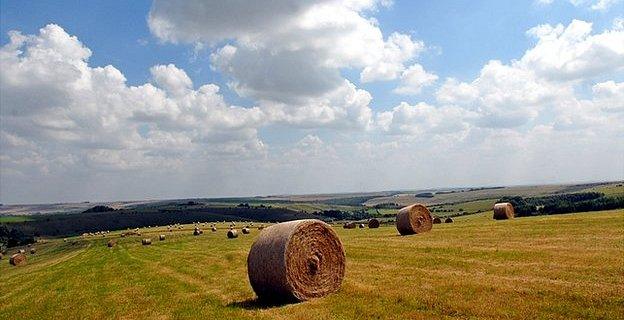Farmers could get paid twice over for 'greening'
- Published

The European Commission is in the process of reforming agricultural policy
Plans to force Europe’s farmers to earn their subsidies by protecting the environment are under attack by MEPs.
The European Commission is attempting to reform the EU’s agriculture policy, under which farmers get subsidies based on the amount of land they own.
The Commission says part of their subsidy should be tied to environmental benefits such as, for example, leaving a portion of arable land uncultivated.
But many MEPs are fighting the proposed changes.
And some are backing an amendment which would effectively see farmers get paid twice over for protecting the environment.
Green campaigners say the double payment row is further sullying the reputation of the already-controversial Common Agricultural Policy (CAP).
Tony Long from WWF said: “Already the CAP is struggling to win public legitimacy. Citizens don’t understand why many farmers are receiving blank cheques while destroying the environment.
“If double payments are being introduced taxpayers will feel that they have been cheated.”
The double payments row applies to farmers who currently get a direct payment for owning land - about £200 ($316; 237 euros) per hectare - then top it up with an extra stewardship grant for farming environmentally, which is typically another £80 a hectare. That gives them, say, £280 a hectare from the taxpayer.
Under the Commission’s reform they would be expected to protect the environment anyway as part of their £200 direct payment. To win an extra £80 they would need to do more green good deeds.
According to the Institute for European Environment Policy (IEEP), some MEPs want these farmers to be able to continue collecting the full £280 in future – but without having to work any harder for it.
The IEEP says in a paper, external that this effectively means they will be paid twice for the same activity.
“It may sound bizarre to hear that some people are proposing double payments for farmers, but it’s true,” said David Baldock, the institute’s director, told BBC News. “This would be illegal and really does have to be quashed.”
I understand the UK government believes that the double funding amendment may be passed when it is voted on Wednesday and Thursday. If it succeeds, it will be resisted fiercely by the Commission (and the UK) in ongoing negotiations which are supposed to be settled by the summer.
A Commission spokesman said: "We will strongly oppose double payments - this is not what the EU budget is for."
But a source close to the negotiations told me: “The amendment is worded in such a way that it may be very difficult for the Commission to unpick. Some MEPs and member states want their farmers to keep getting the same subsidies for doing pretty much the same.”
Cheaper scheme
The complex mix of views from nation states, MEPs and the Commission renders agricultural reform almost impossible.
The UK government says the Commission’s proposals do not go far enough. Ministers want direct payments radically reduced, and say the Commission’s attempt to “green” the CAP are a device to keep farm subsidies high overall.
They want a much cheaper and simpler scheme that is less complex to administer.
Conservative MEP Julie Girling, who represents South-West England, is a member of the European Parliament Agriculture Committee. “We think the greening is greenwash,” she told BBC News.
“The process in Parliament is extremely complicated. We are voting on a series of elaborate compromises which contain many elements each – so it may well be that at the end of the day we will have voted for double payments. If that’s the case we will have to get it taken out at a later stage. This reform process is in danger of taking policy two steps backwards.”
The IEEP is critical of the “greening” plan, too. It says the rules are too vague and that tying 30% of subsidies to environmental services under direct payments is arbitrary and unrelated to the impact of what those services might be.
MEPs backing the double payments were not available for comment at the time of writing.
Follow Roger on Twitter, external
- Published1 July 2013
- Published27 November 2012
- Published12 October 2011